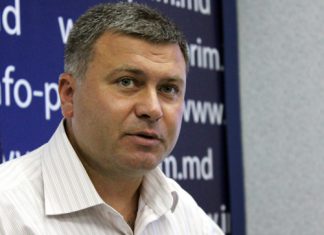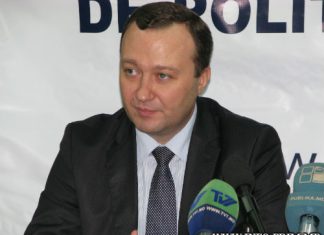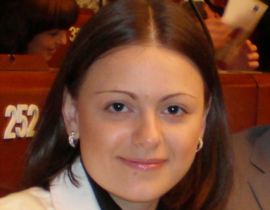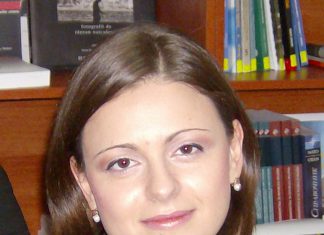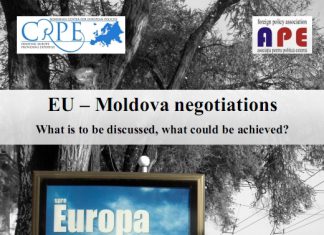Rosian Vasiloi, State Border Management – achievements and challenges in the context of implementing...
Project APE-BTD: Civic Monitoring on the implementation of the Visa Liberalization Action Plan with the European Union”
Alexandru Baltag, The impact of the Republic of Moldovas accession to the European Energy...
The Foreign Policy Association together with Friedrich-Ebert-Stiftung would like to present a study on The impact of the Republic of Moldovas accession to the European Energy Community on the domestic energy security sector, elaborated in the framework of the project Foreign Policy and European Integration Synthesis and Debates”. The Present paper was written by Alexandru Baltag, expert in energy security field.
Ion Schidu: Implementing the anti-discrimination law in the liberalization of the visa regime with...
Extract: http://www.ape.md/wp-content/uploads/public/publications/1844156_en_ion_schidu_stu.pdf
Corneliu Gurin: Anti-corruption reforms in the context of the visa liberalization dialogue with the...
This paper was presented at the EU - Republic of Moldova Forum in Berlin, organized on 22-23 October 2012.
Eugen Revenco: Reform of the Ministry of Internal Affairs (MAI) in the context of...
This paper was presented at the EU - Republic of Moldova Forum in Berlin, organized on 22-23 October 2012.
Viorel Chivriga: The Evolution of Economic Reforms in the Republic of Moldova: 2011 și...
This paper was presented at the EU - Republic of Moldova Forum in Berlin, organized on 22-23 October 2012.
Victoria Bucătaru: Moldova and European Union: from cooperation to integration (2011-2012)
This paper was presented at the EU - Republic of Moldova Forum in Berlin, organized on 22-23 October 2012
Radu Vrabie: Transnistrian Settlement: 2011 și 2012
This paper was presented at the EU - Republic of Moldova Forum in Berlin, organized on 22-23 October 2012.
Moldova scores 8,6 out of 10 for implementing the Action Plan on visa liberalization...
This report is both an assessment of the progress made by Republic of Moldova in implementing the Action Plan for visa liberalization and an analysis of the relationship between Chisinau and Brussels regarding visas, through a detailed comparison with the precedent set by Western Balkan countries, where visas were lifted from 2009 to 2010. The report also includes an analysis of how decisions on visas have been taken and will be taken in the EU.
Victoria Boian: Weaknesses of the legal and institutional support granted to the R. Moldovas...
In the last twenty years, Republic of Moldova registered a series of major changes in political, economic, social and cultural field. The collapse of the Soviet Union generated a continuous transition process in all spheres of human life that led to the emergence of new social phenomena or deepening existing ones, migration of working - age population being one of them. Migration is determined mainly by the lack of jobs and low wages, unstable political situation, lack of social and economic security. According to statistics provided by National Bureau of Statistics, in 2010 around 311 000 people were abroad working or seeking work. At the same time, it is assumed that the actual number of unofficial migrants is around 600 000 people.
”EU Role in the Settlement of the Transnistrian Conflict “
EU role in the 5+2 negotiation process and the possibilities of increasing its involvement in the transnistrian conflict resolution process.
”Taking Stock and Evaluation of Financial Assistance Granted to Moldova by the European Union”
This study suggests an assessment and review in progress for the development assistance that the Republic of Moldova was granted by the European Union.
Niemann, Arne; de Wekker, Tessa: Normative power Europe? EU relations with Moldova. European Integration...
This article analyses the extent to which the European Union (EU) constitutes a normative power in its relations with Moldova. ‘Normative power Europe is examined along three dimensions: (i) normative intent; (ii) normative process; and (iii) normative impact. Our empirical analysis focuses on two norms: democracy and good governance. In addition, we ask how ‘normatively the EU has acted regarding a solution to the Transnistrian conflict. On the basis of our three-dimensional framework, we find that EU normative power can be judged as only moderate in EU-Moldovan relations.
Alexandru Baltag, Associated Expert, APE: “Russian energetic weapon as an instrument of pressure and...
Ukraine and Republic of Moldova, which have not existed as independent states by the Soviet implosion, represented the European interface first of the Russian Empire and then of the Soviet Empire. In these circumstances, this territory, particularly the Ukrainian one, has the role of geopolitical pivot, because the existence of these states as independent by the Kremlin (independent in the strict sense of the word) contributes to Russia's geopolitical transformation. An eventual join of these two countries to the EU and NATO could push Russia in Asia in such a way that the relations between Russia and Europe will be related only to the economic and energetic domain. This fact is perceived as a threat for the Russian Federation, as long as it has played and plays a (geo)political and (geo)strategic role of dominance in Europe during the recent centuries.
Ratification of the Rome Statute of the International Penal Court: an imperative issue on Moldovas...
To investigate the most heinous crimes of the twentieth century - genocide, crimes against humanity and war crimes, the international community has set up ad hoc tribunals such as the International Military Tribunals at Nuremberg and Tokyo, the International Criminal Tribunal for Rwanda and the International Criminal Tribunal for former Yugoslavia. However, genocide, crimes against humanity and war crimes remain a grim reality of the world today. Thus, on July 17, 1998, the Rome Diplomatic Conference adopted the Rome Statute of the International Criminal Court (ICC) with the aim of creating a permanent and competent international court designed to prosecute people who have committed the most heinous crimes known to humanity. Thereby, the International Criminal Court differs from the International Court of Justice, sometimes called the World Court, which settles disputes between governments. Rome Statute of the ICC entered into force on July 1, 2002 and the Court is fully operational, having its seat in Hague, the Netherlands. The treaty was welcomed and appreciated by governments, legal experts and civil society as the most significant achievement in international law since the adoption of United Nations Charter. In this way, the struggle for international justice has made a major breakthrough.
THE FOREIGN POLICY OF THE REPUBLIC OF MOLDOVA (1998-2008)
The Foreign Policy Association (APE) in partnership with Friedrich Ebert Foundation has agreed to conduct a review of the major topics of the foreign policy of the Republic of Moldova during the period 1998-2008. Thus, the present paper does not only try to reestablish the chronology of events, but also highlights the successes and failures of the foreign policy of the Republic of Moldova, analyzes the challenges to be faced by our diplomacy in the given time, and, of course, underscores the possible evolutions and options that Moldova shall take into account in the nearest future.


